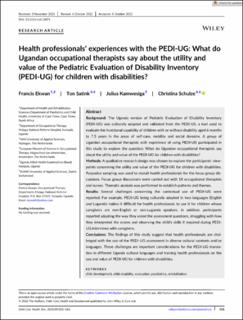Please use this identifier to cite or link to this item:
https://doi.org/10.21256/zhaw-29049| Publication type: | Article in scientific journal |
| Type of review: | Peer review (publication) |
| Title: | Health professionals' experiences with the PEDI-UG : what do Ugandan occupational therapists say about the utility and value of the Pediatric Evaluation of Disability Inventory (PEDI-UG) for children with disabilities? |
| Authors: | Ekwan, Francis Satink, Ton Kamwesiga, Julius Schulze, Christina |
| et. al: | No |
| DOI: | 10.1111/cch.13071 10.21256/zhaw-29049 |
| Published in: | Child: Care, Health and Development |
| Volume(Issue): | 49 |
| Issue: | 3 |
| Page(s): | 555 |
| Pages to: | 562 |
| Issue Date: | May-2023 |
| Publisher / Ed. Institution: | Wiley |
| ISSN: | 0305-1862 1365-2214 |
| Language: | English |
| Subjects: | Child development; Child disability; Evaluation; Paediatrics; Rehabilitation; Child; Human; Uganda; Occupational therapist; Activities of daily living; Disability evaluation; Reproducibility of results; Disabled children |
| Subject (DDC): | 305: Groups (age, origine, gender, income) 615.8515: Occupational therapy |
| Abstract: | Background: The Uganda version of Pediatric Evaluation of Disability Inventory (PEDI-UG) was culturally adapted and validated from the PEDI-US, a tool used to evaluate the functional capability of children with or without disability aged 6 months to 7.5 years in the areas of self-care, mobility and social domains. A group of Ugandan occupational therapists with experience of using PEDI-UG participated in this study to explore the question: What do Ugandan occupational therapists say about the utility and value of the PEDI-UG for children with disabilities? Methods: A qualitative research design was chosen to explore the participants' viewpoints concerning the utility and value of the PEDI-UG for children with disabilities. Purposive sampling was used to recruit health professionals for the focus group discussions. Focus group discussions were carried out with 18 occupational therapists and nurses. Thematic analysis was performed to establish patterns and themes. Results: Several challenges concerning the contextual use of PEDI-UG were reported. For example, PEDI-UG being culturally adapted in two languages (English and Luganda) makes it difficult for health professionals to use it for children whose caregivers are non-English or non-Luganda speakers. In addition, participants reported adapting the way they asked the assessment questions, struggling with how they interpreted the scores and observing the child's skills if required during PEDI-UG interviews with caregivers. Conclusions: The findings of this study suggest that health professionals are challenged with the use of the PEDI-UG assessment in diverse cultural contexts and/or languages. These challenges are important considerations for the PEDI-UG translation in different Uganda cultural languages and training health professionals on the use and value of PEDI-UG for children with disabilities. |
| URI: | https://digitalcollection.zhaw.ch/handle/11475/29049 |
| Fulltext version: | Published version |
| License (according to publishing contract): | CC BY 4.0: Attribution 4.0 International |
| Departement: | School of Health Sciences |
| Organisational Unit: | Institute of Occupational Therapy (IER) |
| Appears in collections: | Publikationen Gesundheit |
Files in This Item:
| File | Description | Size | Format | |
|---|---|---|---|---|
| 2023_Ekwan-etal_Health-professionals-experiences-with-the-PEDI‐UG.pdf | 184.48 kB | Adobe PDF |  View/Open |
Show full item record
Ekwan, F., Satink, T., Kamwesiga, J., & Schulze, C. (2023). Health professionals’ experiences with the PEDI-UG : what do Ugandan occupational therapists say about the utility and value of the Pediatric Evaluation of Disability Inventory (PEDI-UG) for children with disabilities? Child: Care, Health and Development, 49(3), 555–562. https://doi.org/10.1111/cch.13071
Ekwan, F. et al. (2023) ‘Health professionals” experiences with the PEDI-UG : what do Ugandan occupational therapists say about the utility and value of the Pediatric Evaluation of Disability Inventory (PEDI-UG) for children with disabilities?’, Child: Care, Health and Development, 49(3), pp. 555–562. Available at: https://doi.org/10.1111/cch.13071.
F. Ekwan, T. Satink, J. Kamwesiga, and C. Schulze, “Health professionals’ experiences with the PEDI-UG : what do Ugandan occupational therapists say about the utility and value of the Pediatric Evaluation of Disability Inventory (PEDI-UG) for children with disabilities?,” Child: Care, Health and Development, vol. 49, no. 3, pp. 555–562, May 2023, doi: 10.1111/cch.13071.
EKWAN, Francis, Ton SATINK, Julius KAMWESIGA und Christina SCHULZE, 2023. Health professionals‘ experiences with the PEDI-UG : what do Ugandan occupational therapists say about the utility and value of the Pediatric Evaluation of Disability Inventory (PEDI-UG) for children with disabilities? Child: Care, Health and Development. Mai 2023. Bd. 49, Nr. 3, S. 555–562. DOI 10.1111/cch.13071
Ekwan, Francis, Ton Satink, Julius Kamwesiga, and Christina Schulze. 2023. “Health Professionals’ Experiences with the PEDI-UG : What Do Ugandan Occupational Therapists Say About the Utility and Value of the Pediatric Evaluation of Disability Inventory (PEDI-UG) for Children with Disabilities?” Child: Care, Health and Development 49 (3): 555–62. https://doi.org/10.1111/cch.13071.
Ekwan, Francis, et al. “Health Professionals’ Experiences with the PEDI-UG : What Do Ugandan Occupational Therapists Say About the Utility and Value of the Pediatric Evaluation of Disability Inventory (PEDI-UG) for Children with Disabilities?” Child: Care, Health and Development, vol. 49, no. 3, May 2023, pp. 555–62, https://doi.org/10.1111/cch.13071.
Items in DSpace are protected by copyright, with all rights reserved, unless otherwise indicated.